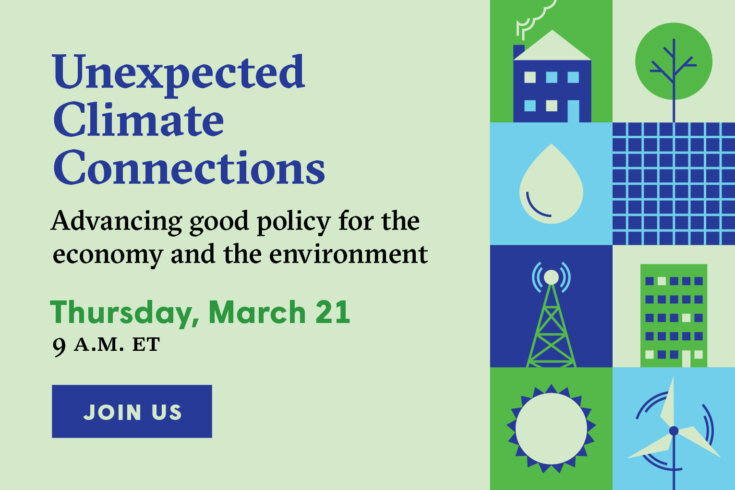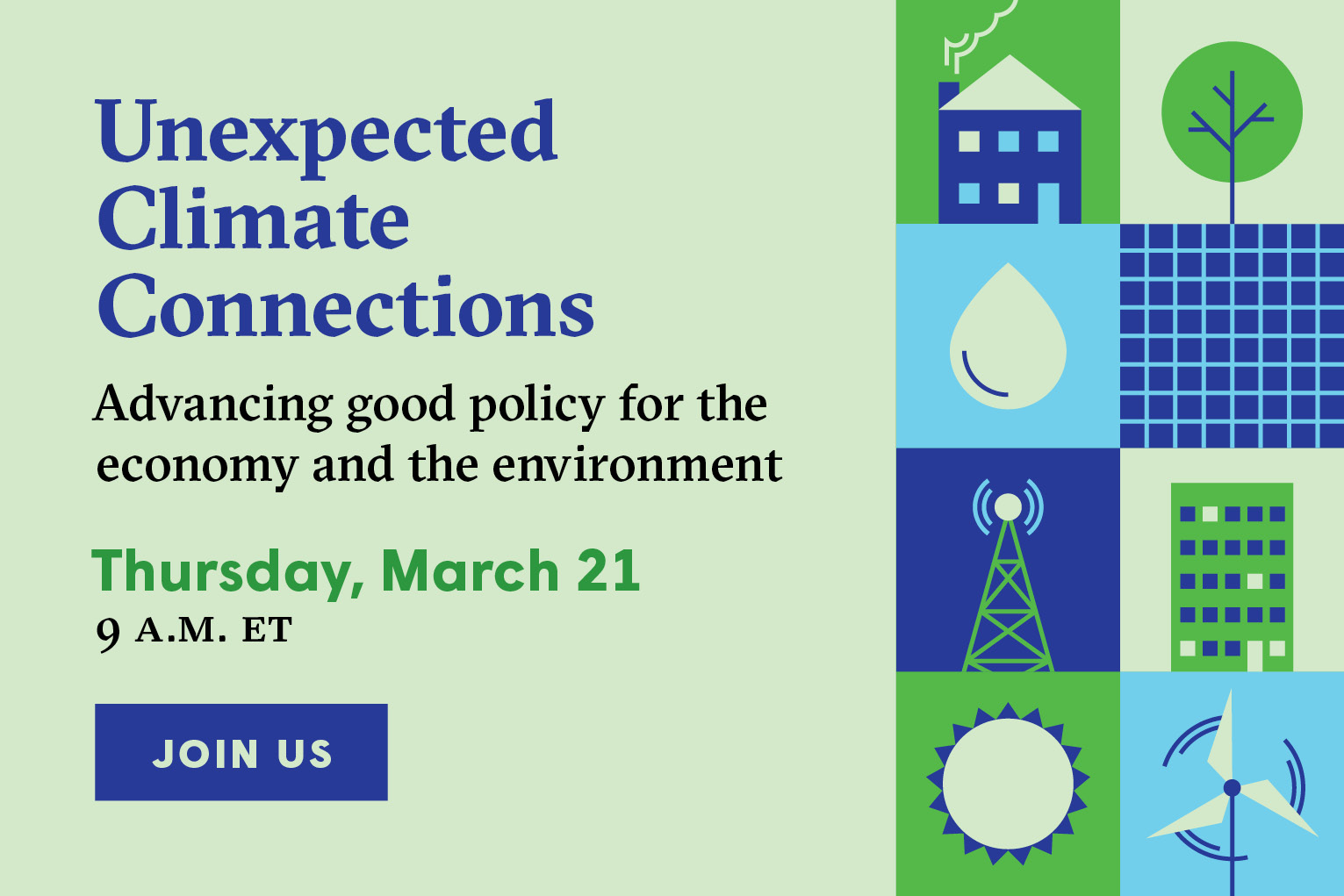Advancing good policy for the economy and the environment
In our complex world, we often hear that “everything connects to everything else.” The purpose of this one-day conference is to examine some of the unexpected or underappreciated linkages between advancing climate policy and achieving other important policy objectives.
Climate policy may not connect to everything else, but it certainly connects with many things, and those connections make policy design and implementation even more complicated than normal.
Join us, in Toronto or online, for a riveting day of discussion and debate about advancing good policy for the economy and the environment.

TELUS Harbour,
3rd Floor Flex Space,
25 York Street, Toronto
Thursday, March 21, 2024
9:00 a.m. – 5:15 p.m. ET
General Admission: Free with registration
Livestream: Free with registration
9:15 AM – 10:30 AM ET
Panel 1: Digital Connectivity as Climate Policy?
Improved digital connectivity has the potential to empower emissions reductions and support climate resilience. The “internet of things” and sensors, if well designed and carefully employed, will be critical components of lowering greenhouse gas emissions in agriculture and natural resources, electricity grids, and homes and buildings. In addition, as climate-related disasters become more frequent, digital connectivity has become the essential service driving emergency responses, community mobilization, protection, and recovery. Do our current climate policies produce the right economic and market-based incentives to generate these connectivity improvements, or do we need additional policies to get there? If so, which ones?

Anna Kanduth, Director, 440 Megatonnes at the Canadian Climate Institute
Sangeeta Lalli, Public Policy Director, TELUS Agriculture and Consumer Goods
Matthew Mendelsohn, CEO, Social Capital Partners
Scott Ross, Executive Director, Canadian Federation of Agriculture
Bios (Read More)
Anna Kanduth is the director of the Canadian Climate Institute’s 440 Megatonnes initiative. Anna was previously a member of the institute’s mitigation team, where she contributed to major research projects on climate accountability, net zero pathways, and clean electricity. Before joining the institute, Anna worked as a policy analyst at Natural Resources Canada. She holds a master’s in public policy from the University of Toronto and a BA from McGill University.
Sangeeta Lalli has extensive policy, government, and communications experience in the agriculture and agri-food industries across the public and private sectors. From advising the prime minister of Canada and cabinet ministers to shaping a $3 billion partnership supporting Canada’s agriculture and agri-food sector, Sangeeta brings unique experiences to policy development. Sangeeta is currently a public policy director at TELUS Agriculture and Consumer Goods, focusing on policy solutions to accelerate agriculture technology adoption supporting sustainability, food safety, and supply chain outcomes for Canadians.
Matthew Mendelsohn and Social Capital Partners lead work on wealth concentration and the financialization of the Canadian economy and the risk they pose for democratic resilience. For over twenty-five years, Matthew has designed and implemented public policy solutions that work at scale. He was a deputy minister with both the governments of Canada and Ontario, the founding director of the Mowat Centre at the University of Toronto, a senior advisor with the Boston Consulting Group, and a professor of politics and public policy at Queen’s University and Toronto Metropolitan University. Matthew has a BA from McGill University, a PhD from Université de Montréal, and an ICD.D from the Rotman School of Management.
Scott Ross has been the executive director of the Canadian Federation of Agriculture since 2022. Prior to that, Scott served as CFA’s assistant executive director and director of farm policy, where he covered a wide variety of agricultural issues. Scott has extensive experience in collaborating across the agri-food sector to achieve ambitious goals, most recently including co-founding the Agriculture Carbon Alliance, a coalition of seventeen national farm associations advocating on behalf of farmers with regard to carbon pricing and environmental policies.
11:00 AM – 12:15 PM ET
Panel 2: Economic Development in Indigenous Communities as Climate Policy?
An important part of reconciliation involves achieving economic balance for Indigenous people in Canada. Genuine equity partnerships between First Nations, Inuit, and Métis peoples and Canadian companies offer a path forward for enduring economic development. Economic reconciliation may also be the key to clearing the many hurdles for the large-scale renewable-energy projects that will be required to achieve Canada’s ambitious GHG-reduction targets. What policies can ensure that access to financial capital is adequate for the creation of these partnerships and can help us achieve our climate goals while advancing Indigenous economic outcomes?

Kayli Avveduti, Executive Director, Confederacy of Treaty Six
Matthew Foss, VP, Research and Public Policy, Canadian Council for Aboriginal Business
Jesse McCormick, Senior VP, Research, Innovation & Legal Affairs, First Nations Major Projects Coalition
Marissa Nobauer, Director, Reconciliation, Community Engagement and External Relations, TELUS
Bios (Read More)
Kayli Avveduti is Nēhiyaw from the Treaty 6 Territory, born and raised in the Alexander First Nation in Alberta. Kayli is currently the executive director for the Confederacy of Treaty Six First Nations. Kayli is a strategic mind who brings a belief system and a lived experience rooted in Indigenous Knowledge and Values to all she does. She is a trusted advisor and leader for Chiefs, Elders, community members, and partners. Her tenacity and compassion for her People make Kayli an incredible advocate and leader. She works tirelessly to ensure communities are informed and working strategically to move First Nations initiatives forward. Kayli completed her master’s of public policy at McGill University and also holds a BA in political science from MacEwan University.
Matthew Foss is a member of the Métis Nation of Alberta. He brings over twenty years of experience in the Canadian energy industry, specializing in energy economics, along with extensive experience with research and public policy development. He currently serves as the vice president of research and public policy for the Canadian Council for Aboriginal Business and is an executive fellow at the University of Calgary’s School of Public Policy. Matthew’s focus at the CCAB is on advancing Indigenous business through research and advocacy related to procurement, international trade, celebrating Indigenous entrepreneurs, and natural resource development. Prior to joining the CCAB, he ran his own energy economics and public policy consulting business for several years and served as the chief energy economist for the Alberta government.
Jesse McCormick serves as the senior vice president of research, innovation, and legal affairs at the First Nations Major Projects Coalition, a not-for-profit dedicated to supporting First Nations’ participation in major projects being developed within their traditional territories. As a proud member of Chippewas of the Thames First Nation, Jesse works to advance the rights and interests of First Nations through economic participation and environmental protection.
Marissa Nobauer is director of reconciliation, community engagement, and external relations at TELUS, working with a team of passionate professionals across the business who are responsible for partnering with and advocating for Indigenous and rural communities in TELUS’s serving area, in order to advance access to broadband connectivity and implement TELUS’s first ever Indigenous Reconciliation Action Plan. Marissa is also responsible for governance of TELUS’s relationship with its utility partners on TELUS’s strategic infrastructure assets. Marissa holds a MSc in international development and management (Lund University) and a BA in political science (SFU). Marissa is of settler heritage, the descendant of Ukrainian Jewish refugees and post–World War II German/Dutch migrants.
1:30 PM – 2:45 PM ET
Panel 3: Housing Affordability as Climate Policy?
With the explosion of demand and various obstacles to supply, the affordability of rental and purchase housing in Canada has been evaporating over the last decade. The need for more housing is also a need for more climate-friendly housing, meaning reduced GHG emissions and greater resilience to extreme weather events. Can we have a greater availability of more affordable housing that is also more climate friendly, or must we choose between these two objectives? We owe it to today’s young Canadians to make serious progress on both fronts, but how can this be achieved?

Steve Mennill, Planning and Housing Finance Consultant
Mike Moffatt, Founding Director, PLACE Centre
Rachel Samson, Vice President of Research, Institute for Research on Public Policy
Phillip Santana, Director, Sustainability, Mattamy Homes Canada
Bios (Read More)
Steve Mennill is a planning and housing finance consultant with an interest in improving climate compatibility, social inclusion, and affordability. Over a thirty-year career with CMHC, Steve held a variety of senior positions in housing policy and mortgage insurance, as chief risk officer and chief climate officer. Steve has also worked as a consulting urban planner. Steve serves on the board of directors of the Ottawa Food Bank, on the board of Evergreen Canada, on the advisory committee of the Intact Centre on Climate Adaptation, and on the board of two community-based associations. He holds degrees in business, urban planning, and land economics.
Mike Moffatt is the founding director of the PLACE Centre. Mike’s research focuses on the intersection of regional economic development, building child-friendly, climate-friendly housing and communities, and clean innovation. In 2017, Mike was the chief innovation fellow for the government of Canada, advising deputy ministers on innovation policy and emerging trends.
Rachel Samson is the vice president of research at the Institute for Research on Public Policy (IRPP). She manages a team that undertakes policy research and analysis on a range of topics, including affordability, workforce transition, and industrial policy. Previous to her current role, she was clean growth research director at the Canadian Climate Institute. Rachel also spent fifteen years as an economist and executive with the federal government and five years as an independent consultant.
Phil Santana is the Canadian director of sustainability at Mattamy Homes—Canada’s largest homebuilder. Phil leads initiatives that position the organization at its best through sustainability and strategic execution. Current efforts focus on the strategic analysis of operational and embodied carbon and establishing a baseline knowledge within the organization and the industry. Phil is currently a member of the Canadian Home Builders’ Associations Net Zero Council Management Committee, as well as a lead contributor to Mattamy’s efforts in the Climate Smart Building Alliance, which was created by Mattamy Homes, RBC, and EllisDon to help get Canada’s building sector to net zero.
3:00 PM – 4:00 PM ET
Policy Debate: What Is a “Green Industrial Policy,” and Does Canada Need One?
Climate policy has made great advances in Canada and elsewhere over the past decade. Carbon pricing has been an important part of the policy packages in many countries, but other non-pricing climate policies have also been adopted. These policies change incentives in the marketplace, toward fewer emissions and the adoption of cleaner technologies. But do we need even more intrusive policy actions? Do we need governments to dust off and recalibrate their 1970s-style “industrial policy” tools, or should we be relying on the incentives created by more universal policies? What would a “green industrial policy” look like today, and what are the cases for and against this kind of approach?

Moderator:
Martha Hall Findlay, Director School of Public Policy and James S. and Barbara A. Palmer Chair in Public Policy, University of Calgary
Debaters:
Kenneth Boessenkool, Founding Partner, MB Policy
Rick Smith, President, Canadian Climate Institute
Bios (Read More)
Prior to joining the School of Public Policy, Martha Hall Findlay was chief sustainability and chief climate officer for Suncor Energy, Canada’s largest integrated energy company. She led Suncor’s ESG efforts, including Indigenous and other community, public, and government relations. She was instrumental in the development of the multi-company Oil Sands Pathways to Net Zero by 2050 initiative. Prior to Suncor, Martha was the president and CEO of the Canada West Foundation. She has written dozens of essays, articles, and op-eds for national publications and has frequently appeared as a thought leader in national print and broadcast media. She has many years of experience as a corporate lawyer, international trade expert, and senior business executive in Canada and in Europe. She was named a Canadian climate champion in 2021; one of Canada’s Clean50 for 2022; a top global female oil and gas executive; and one of the top 275 global women influencers. As a twice-elected member of Parliament, she served in the official opposition shadow cabinet for international trade; finance; transport, infrastructure, and communities; and public works and government. She also served on the House of Commons committees for all of those portfolios.
A bold, intuitive thinker, policy shaper, and prolific writer, Ken Boessenkool co-founded Meredith Boessenkool to continue influencing policy and working to make the next chapter better for his fellow Canadians. One of Canada’s leading policy strategists, Ken’s list of accomplishments is long, including his recent stint as the JW McConnell professor of practice at the Max Bell School of Public Policy at McGill University and his recurring role as research fellow at the CD Howe Institute. While Ken has been front and centre in Canadian politics for almost three decades—working with Stephen Harper, Ralph Klein, Jim Dinning, Christy Clark, Stockwell Day, Ric McIver, and many others—he remains most proud of the following stand-out initiatives that helped change people’s thinking and lives. Over the course of his career, Ken has worked for and founded a variety of public affairs firms, played senior roles in provincial governments, was a senior regulatory economist with two electricity firms, and the architect of political campaigns nationally and in British Columbia, Alberta, and Ontario.
Rick Smith is president of the Canadian Climate Institute, Canada’s foremost climate change policy research organization. One of the institute’s focuses is clean growth and the economic implications of the net zero transition. For over twenty-five years, Rick has led organizations dedicated to improving public policy through the creation and communication of the best research and evidence. He has co-authored two bestselling books on the impacts of pollution on human health. He holds a PhD in biology from the University of Guelph and lives in Toronto.
Accessibility Information
We strive to be accessible and inclusive. If you require support to be able to fully participate in this event, please contact [email protected] or (416) 971-5004, ext. 247.



